|
|
|
Sort Order |
|
|
|
Items / Page
|
|
|
|
|
|
|
| Srl | Item |
| 1 |
ID:
125113
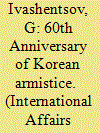

|
|
|
|
|
| Publication |
2013.
|
| Summary/Abstract |
ON JULY 27, 2013, it will be 60 years since the Armistice Agreement was signed in the village of Panmunjom, putting an end to the three-year Korean War. That war, which has become the bloodiest and most devastating military conflict since the end of World War II, remains an unhealed wound for the Koreans while its consequences are still making an impact on the international situation in Northeast Asia and beyond.
|
|
|
|
|
|
|
|
|
|
|
|
|
|
|
|
| 2 |
ID:
101882
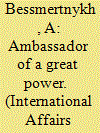

|
|
|
|
|
| Publication |
2010.
|
| Summary/Abstract |
THE TRAGIC 20th CENTURY, which was mixing up ideologies, breaking up socioeconomic systems, unleashing global wars and then keeping the world almost continuously in a state of tense instability, at the same time gave rise to the special need for skillful, sophisticated and strong diplomacy. This effective foreign policy tool was being honed for decades and increasingly used by our country for the protection of its security and peaceful development.
|
|
|
|
|
|
|
|
|
|
|
|
|
|
|
|
| 3 |
ID:
077862
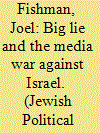

|
|
|
| 4 |
ID:
171269
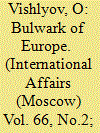

|
|
|
|
|
| Summary/Abstract |
NO BALANCE in Eastern Europe and, therefore, in entire Europe is possible as long as the Muscovite Empire exists. No new order in possible in an unbalanced Europe. ... "Therefore, the Muscovite Empire should be liquidated... ... "Its liquidation, indispensable for the calm and order in Europe, is fairly easy to realize since the Ukrainian people have already covered a considerable part of the road by its staunch and sacrificial struggle against Moscow.
|
|
|
|
|
|
|
|
|
|
|
|
|
|
|
|
| 5 |
ID:
095119
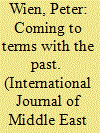

|
|
|
| 6 |
ID:
157413
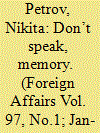

|
|
|
|
|
| Summary/Abstract |
Every spring, buses covered in portraits of Joseph Stalin appear on the streets of Russian cities. His face replaces ads for cell phones, soft drinks, laundry detergent, and cat food. With each passing year, the dictator gets more handsome and more glamorous; a portrait of him in his gorgeous white generalissimo’s jacket has become especially popular. He casts his stern gaze on the citizens, as if to say, “Remember me? I’m here, I didn’t go anywhere—and don’t you forget it!”
|
|
|
|
|
|
|
|
|
|
|
|
|
|
|
|
| 7 |
ID:
167992
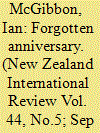

|
|
|
|
|
| Summary/Abstract |
Ian McGibbon recalls a battle that sealed Nazi Germany’s fate 75 years ago.
|
|
|
|
|
|
|
|
|
|
|
|
|
|
|
|
| 8 |
ID:
151822
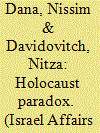

|
|
|
|
|
| Summary/Abstract |
While Holocaust denial existed even during the Holocaust itself, this phenomenon has substantially expanded and diversified over the past decades. This ranged from the advent of technologies that shifted the debate to new platforms and forums, to Israel’s comparison to Nazi Germany, to Islamist-driven Holocaust denial and anti-Semitism on European streets. Paradoxically, concurrently with the intensification of Holocaust denial by Arabs and Muslims, they have made massive use of Holocaust symbols, language, and discourse in their national struggle. This article presents this paradox ‒ Arab Holocaust denial and Holocaust memory manipulation ‒ in an attempt to identify ways and means to address this phenomenon against the backdrop of the Arab‒Israeli conflict.
|
|
|
|
|
|
|
|
|
|
|
|
|
|
|
|
| 9 |
ID:
112860
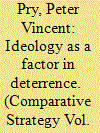

|
|
|
|
|
| Publication |
2012.
|
| Summary/Abstract |
History is replete with examples of deterrence failure and war occurring unexpectedly, taking nations by surprise, because of failure to comprehend an adversary's ideology. The modern world has been shaped by failure to comprehend the ideologically driven aggression of Nazi Germany, Imperial Japan, Soviet communism, and Islamic jihadism. The Soviet "war scare" during NATO's nuclear exercise ABLE ARCHER-83 exemplifies how ideology could cause deterrence failure and even nuclear war. Understanding the ideology of potential adversaries must be part of any informed deterrence strategy. U.S. overconfidence in deterrence theory, which is itself an ideological belief system, could contribute to deterrence failure.
|
|
|
|
|
|
|
|
|
|
|
|
|
|
|
|
| 10 |
ID:
122084
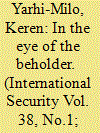

|
|
|
|
|
| Publication |
2013.
|
| Summary/Abstract |
How do policymakers infer the long-term political intentions of their states' adversaries? A new approach to answering this question, the "selective attention thesis," posits that individual perceptual biases and organizational interests and practices influence which types of indicators a state's political leaders and its intelligence community regard as credible signals of an adversary's intentions. Policymakers often base their interpretations on their own theories, expectations, and needs, sometimes ignoring costly signals and paying more attention to information that, though less costly, is more vivid (i.e., personalized and emotionally involving). In contrast, intelligence organizations typically prioritize the collection and analysis of data on the adversary's military inventory. Over time, these organizations develop substantial knowledge on these material indicators that they then use to make predictions about an adversary's intentions. An examination of three cases based on 30,000 archival documents and intelligence reports shows strong support for the selective attention thesis and mixed support for two other approaches in international relations theory aimed at understanding how observers are likely to infer adversaries' political intentions: the behavior thesis and the capabilities thesis. The three cases are assessments by President Jimmy Carter and officials in his administration of Soviet intentions during the collapse of détente; assessments by President Ronald Reagan and administration officials of Soviet intentions during the end of the Cold War; and British assessments of Nazi Germany before World War II.
|
|
|
|
|
|
|
|
|
|
|
|
|
|
|
|
| 11 |
ID:
126981
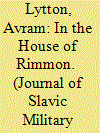

|
|
|
|
|
| Publication |
2013.
|
| Summary/Abstract |
British efforts to aid the Soviet Union in the early months of the war in the East are underexplored and simplified in the historiography of Allied supply to the Soviet Union during the Second World War. In fact, British leaders recognized within weeks of the German invasion that the Eastern Front was the most important front in the war against Nazi Germany and that the Soviets were likely to continue to resist for a long time. Britain then became increasingly committed to supplying the Soviets with material aid. Despite the difficulties involved, and Soviet uncooperativeness, British aid prior to the Moscow Supply Conference was substantial and relatively swift. The expansion of aid into a large-scale effort, later established on a lend-lease basis, had its origins in the evolution of British assessments and priorities over the summer of 1941.
|
|
|
|
|
|
|
|
|
|
|
|
|
|
|
|
| 12 |
ID:
102430
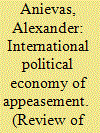

|
|
|
| 13 |
ID:
123404
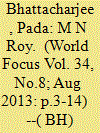

|
|
|
|
|
| Publication |
2013.
|
| Summary/Abstract |
Starting his political career as a nationalist by 1902 or 1903, Manabendra Nath Roy (1887-1954) embraced Marxism by 1917, and after about three decades of Communist activities he gave up Marxism in favour of humanism. This transition from Marxism to humanism is a fascinating story which may be discussed in brief outline not simply as a tribute to his memory on the occasion of his 150th birth anniversary, but also for clarification of our ideas regarding the limitations of Marxism and the way to overcome them.
|
|
|
|
|
|
|
|
|
|
|
|
|
|
|
|
| 14 |
ID:
102421
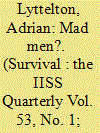

|
|
|
|
|
| Publication |
2011.
|
| Summary/Abstract |
The Madman theory remains a reliable conversation stopper in current strategic debates. Saddam Hussein had to be destroyed because deterrence was deemed unworkable against a tyrant presumed to be irrational. The same argument is now used regarding Iran's clerical regime, often with the added claim that national suicide is an insufficient disincentive for rulers obsessed by eschatological ends. In all such arguments, the temptation to play the Hitler analogy is rarely resisted. The comparison is usually fanciful, but if it is going to be used, we should at least get Hitler right. This is among several important things that Ian Kershaw does in his admirable book.
|
|
|
|
|
|
|
|
|
|
|
|
|
|
|
|
| 15 |
ID:
094723
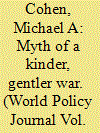

|
|
|
| 16 |
ID:
049506
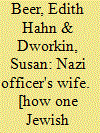

|
|
|
|
|
| Publication |
London, Abacus, 1999.
|
| Description |
305p.Pbk
|
| Standard Number |
0349113793
|
|
|
|
|
|
|
|
|
|
|
|
Copies: C:1/I:0,R:0,Q:0
Circulation
| Accession# | Call# | Current Location | Status | Policy | Location |
| 047252 | 943.605092/BEE 047252 | Main | On Shelf | General | |
|
|
|
|
| 17 |
ID:
126267
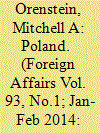

|
|
|
|
|
| Publication |
2014.
|
| Summary/Abstract |
Anyone who knows Polish history cannot help but marvel at the country's emergence from the ashes of its traumatic past. Over the last 25 years, Poland, after centuries of war and subjugation, has enjoyed peace, a stable and booming economy, and integration with the rest of Europe.
|
|
|
|
|
|
|
|
|
|
|
|
|
|
|
|
| 18 |
ID:
093619
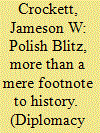

|
|
|
|
|
| Publication |
2009.
|
| Summary/Abstract |
The January 1933 appointment of Adolf Hitler as Chancellor of Germany marked the beginning of the end of the fragile post-war peace throughout Europe. The Polish leadership had good reason to fear his threats of revising the Treaty of Versailles. Realising that Hitler was too dangerous to remain in power, the Polish leadership led by Marshal Jzef Pisudski prepared for a preventive war against Germany. Unfortunately, the appeasement policy among the Western Powers condemned this plan to failure and forced Poland into signing a non-aggression pact with Germany in 1934; thus dooming Poland's existence. To test his premonitions about Hitler, Pisudski created several international "incidents" concerning the Free City of Danzig, designed to test both Germany and whether the Western Powers would fight to uphold the Treaty of Versailles. Pisudski's efforts offer proof that Poland deserves more credit for its determination to deal with a rising tide of Nazi Germany.
|
|
|
|
|
|
|
|
|
|
|
|
|
|
|
|
| 19 |
ID:
123762
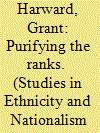

|
|
|
|
|
| Publication |
2013.
|
| Summary/Abstract |
During the Second World War, the Romanian Armed Forces joined in the conflict between Nazi Germany and Soviet Russia. The Romanian Army's contribution to the Axis war effort has been largely forgotten or sidelined since the war. Similarly, Romania's minorities and their military service or restriction from military service has been overlooked. Romania's expansion after the First World War greatly increased the number of minorities in the country and also those serving in the military. The way the Romanian Armed Forces dealt with minorities and their contribution to the Romanian war effort should not be forgotten as the true extent and depth of the war on the Eastern Front is being revealed. Romanian nationalist and ethnic policies affected the ranks as much as it shaped the rest of its wartime policy of ethnic 'purification'.
|
|
|
|
|
|
|
|
|
|
|
|
|
|
|
|
| 20 |
ID:
127358
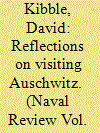

|
|
|
|
|
|
|
|